from Success Magazine
The Casey-Murphy Handicap
by Ellis Parker Butler
It never pays to boast. Casey and Murphy worked side by side at a table in the Royal Pickle Factory, corking pickle bottles and dipping the corked necks into red sealing wax. They were both well along in years, but the spirit of unconquered youth still lingered on their tongues, and as they worked they talked. The Annual Picnic of the Royal Pickle Factory Employees' Mutual Benevolent Association had been set for the eighteenth of July, and tickets were already for sale: "Lady and Gent, Fifty Cents." The picnic was to be at the Fair Grounds, and there were to be games.
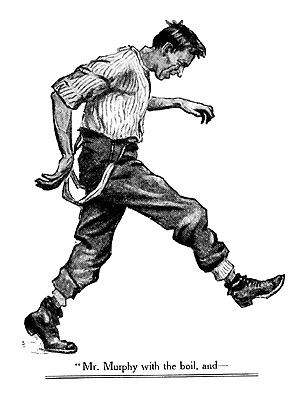
"I was a runner mesilf, in me young days," said Casey. "There was only wan other lad was faster than me in th' county, and ivry toime we ran I bate him. 'T was a joy, Murphy, t' see me legs revolvin' loike buggy spokes, a leppin' over th' ground, and th' pigs hurry-skurryin' out av th' way, thinkin' I was an autymobile, only there was none in thim days."
Murphy pushed in a cork.
"Sure," he said, "they was grand runners in th' Ould Country in thim days, Casey. I was wan av thim. But 'tis laughin' I am whin ye say th' pigs got out av yer way, Casey. Whin I run there was no toime fer thim t' git annywhere. I was past before they suspicted I was comin'."
"'T is well known, th' laziness av th' pigs in County Clare," said Casey; "they be so fat an' lazy they move fer nawthin'."
"Are ye sayin' I c'u'd not run?" inquired Murphy.
"I'm sayin' nawthin'," said Casey, "but 't is well known all over Ireland that a Kerry lad can run a mile whilst wan from Clare is runnin' two."
"'T is not true," said Murphy, coldly. "Whin I was a lad I c'u'd run a mile anny day whilst ye was runnin' three, Casey. I was a grand runner, thim days. And th' endurance av me! 'T was surprisin'!"
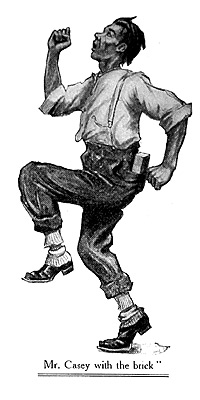
"'T is sad th' change thet has come over ye since," Casey said. "No wan would suspect it now."
"Oh, 't is not so bad as that!" Murphy bragged, shifting from one rheumatic leg to the other; "there be many a run left in th' legs av me yet, Casey. There be more run left in wan av me legs than in th' two of yours, I wager."
"List t' th' curious felly!" jeered Casey.
"Come outside, where I kin give me fists full play, and I'll show ye I kin do as I say," Murphy dared him. "Let me but git wan av me fists agin th' face av ye, Casey, and 't will be a different opinion av me runnin' ability ye'll be havin'."
"Do ye run on yer fists, then, Murphy," asked Casey, scornfully, "like a clown in a circus? No wan was sayin' but ye have a fist loike a ham, and 't is a wonder th' pipe-stem legs of ye kin carry thim two chunks av fist, but as fer runnin'!"
The result was that the manager of the picnic put on the program of the day's sports an extra number: "12A, One Mile Running Race, Timothy Casey, Mike Murphy, for the Championship of the Sealing Table," and Casey and Murphy went into training.
Murphy began his training by running around the block on which his shanty was located. He ran half way around once, and then decided that it was bad policy to expend all his energy before the day of the race. There was no use tiring himself all out before the race; he would store up his vitality and have it intact at the pistol shot. He therefore began a course of absolute rest. When he was not working he sat with his legs stretched straight before him, letting them accumulate energy.
Casey, on the other hand, trained violently. He began, too, by running around a block, and the next day he did not go to work, being so stiff and sore that he had to lie in bed, but his spirit was undaunted. Each night he oiled his knee joints with machine oil to limber them up, and each morning he wrapped them in woolen rags soaked in arnica. It gave the sealing room at the pickle factory a peculiar odor that did not mix well with the acid scent of the vinegar. All day, while at work, he worked his legs up and down, as if he was riding an invisible bicycle. This was to prepare him for the endurance needed in the big race, and, to cultivate speed, he increased the rapidity of the operation from time to time, while Murphy looked on with scorn.
"Luk at him," he said; "he do be thinkin' 't is a race on a sewing-masheen he will be runnin'."
It was, indeed, peculiar to see Casey take a case of sealed pickle bottles and proceed across the room with them, his legs going up and down at the rate of a mile an hour, and himself proceeding but twelve feet in five minutes. He looked something like those fat, prancing, high school cobs that are all up-and-down motion and no progress, but what is not uncommon in a plump horse is somewhat surprising when seen in an elderly, sober-faced Irishman. Casey, from the belt up, was the honest workman attending severely to his job; from the belt down he was covering mile after mile of cinder path. He was so tired by the eighteenth of July that he could hardly stand up on his legs unaided, though he kept up a brave front.
When the twelve events that came first on the program had been disposed of, Casey and Murphy removed their coats and vests and descended to the track. The picnic was held at the fair grounds, and as the two men looked at the half-mile trotting track, stretching out in a tremendous oval of dust, and considered that they would have to traverse it twice, the world seemed but a sad and weary place to them. But for the gathered friends and fellow-employees, who gazed down upon them from the grandstand, they would willingly have let bygones be bygones, but until one is beaten there is no such word as recant in the mouth of the true Irishman. Even so, Murphy and Casey approached the starting line reluctantly and slowly. Casey was clearly over-trained. His legs would not stand still. They pranced up and down, in spite of him. They were capering, prancing legs, and you looked around to see who they belonged to, and, when you saw Casey himself, dismal of face and solemn eyed, you felt like begging some one's pardon -- either the legs' pardon or Casey's.
Murphy approached his fate haltingly. If Casey's legs seemed to dash madly to the fray, Murphy's legs seemed to balk and hang back from it. If they could they would have turned around and gone home and lain down and left Murphy to get along the best he could without them. Murphy's legs did not see anything funny in the impending race, but it was not that that bowed Murphy's head. He had a boil on the back of his neck,
As the two men entered the track, the master of the games, the starter, and the referee approached them.
"All ready?" asked the master, in his made-for-public-use voice.
"I'm ready," said Casey, sadly; "me legs is wild t' be off." They were not half as wild to be off as Murphy's were.
"Wan minute!" said Murphy, "wan minute before you shoot off that gun! I claim a handicap fer th' bile on th' back av me neck. 'T is unheard av, t' make me run even wid Casey and me sufferin' th' tortures wid a bile on me neck ivry toime I move me legs."
"Go awn, now!" Casey said. "Did ye iver hear av a runnin' racer gittin' handicaps fer biles? 'T is no fault av mine ye hev a bile, Murphy, an' why sh'u'd ye tax me for it?"
The referee looked at the boil and shook his head, in doubt what to do.
"'T is a bad wan!" he declared. "'T is a blem bad bile y' 'ev got, Murphy, but how t' handicap fer a bile I dunno. 'T is not as if I was a professional handicapper, now, that knows all the rules av handicappin'. If 't was a game av pool, now, I w'u'd know; and if't was billiards I w'u'd know, and if 't was th' record av ye over th' mile track I w'u'd know, but a bile is different. What t' allow off fer a bile, I dunno. What w'u'd ye be givin' fer a bile, Dugan?" he asked the starter.
"Wan says wan thing, and wan says another," said Dugan, judicially. "Shoemaker's wax is good and worruks quick, but it draws harrud, and bread-and-milk poultice is good; and flaxseed is good; and wance I had a bile on me face an' nawthin' w'u'd stick on, an' th' ould woman says flour mixed in honey is good and sticks annywhere --"
"But 't is not --" began the referee.
"Aisy, now, aisy!" said Dugan. "I 'm not recommindin' honey and flour mesilf, fer the ould woman mixed a fine bier gob av it and put it on th' face av me, whin I wint t' bed, and th' nixt morn in' I was honey and flour from head t' foot. 'T was in me hair, and everywhere but on th' bile, an' th' bile settin' on me face and laughin' at me fit t' burst. But it did not burst. Not 'til free days."
"But we do not want t' cure th' bile," explained the referee.
"Then ye be a curious felly," said the starter; "fer if I had wan I sh'u'd want t' cure it. There be some call thim pets, 'tis true, but --"
"'T is on Murphy, it is," the referee insisted, "and 'tis how much handicap sh'u'd we give him fer a bile, I'm wantin' t' know."
"'T is a bad bile," said Murphy. "I'm thinkin' ye sh'u'd give me wance around th' track fer the bile. Me build is such," he explained, "wid th' long neck av me, that me head bobs back an' front ivry step, whin I 'm runnin' me best. If I do not bob me head I kin not let out me full speed, and wid a bile on me neck I kin not bob."
"'T is too much!" objected Casey. "No wan w'u'd give half a mile fer a bile. 'T is outrageous."
"In th' horse races," suggested the starter, "they mek th' best horse carry extry weight t' overcome th' deficiency av th' difference."
"Sure, and 't is fair Casey sh'u'd carry weight t' even it up," agreed the referee. "He sh'u'd carry th' weight av th' bile. How much it weighs, I dunno."
"Twinty pounds," "Wan ounce," said Murphy and Casey simultaneously.
"Let Casey carry a brick," suggested the starter, and this was agreed upon. Casey decided to carry it in his hand.
The race, as is well known, is not always to the swift. Generalship counts for as much as speed, particularly in a mile run, and Casey and Murphy had had abundant advice from their friends as to how to run the race. They knew they should not expend all their strength at first, but treasure it for the final burst of speed on the homestretch.
Mr. Casey, with the brick, and Mr. Murphy, with the boil, lined up at the starting line. One thought filled both their minds: to let the other set the pace and to follow at his heels until the homestretch. The starter raised his pistol.
"Are yez ready?" he cried.
"Yis!" said Casey, briskly. "I am!" said Murphy.
The blunt snap of the short-nosed revolver was heard, the timekeeper noted the starting time, and Casey and Murphy were off! A cheer rang from the grandstand. It died, and a look of wonder and surprise passed over the faces of the employees of the pickle factory.
The runners were off! Casey was off, his legs popping up and down at the rate of forty revolutions to the minute, the brick held balanced on his extended upturned hand as if it was some priceless, tender egg. And Murphy was off, his back stiff and his neck bent stiffly forward, as if he had to balance the boil on it, and was afraid to tread hard lest it fall off. They were off, but the starter, the referee, the master of the games, and the timekeeper leaned forward and stared at them astonished. 'Round and 'round in a circle three feet wide went Casey with the brick and Murphy with the boil, Casey at Murphy's heels, and Murphy at the heels of Casey; but from the starting line they did not move. They went 'round, and they went 'round, but no one could tell whether Casey was ahead or Murphy behind. Casey's legs were going the faster, but Murphy's stride was longer. Casey made the circle in ten steps, but Murphy made it in three, making a triangle of it. They were jockeying for the rear position.
The race officials crowded around them. There is no racing rule known that permits a referee to lay hands on a runner while he is running, and Casey and Murphy were undeniably running.
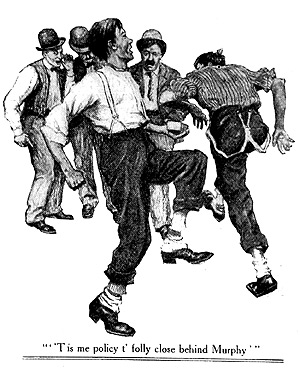
"Go awn!" shouted the referee. "Break away!"
"'Tind yer own business," panted Casey, "'T is runnin' I am. 'T is me policy t' fally close behint Murphy."
"Git a move on ye, Murphy," urged the starter. "Cut loose from him an' scoot! 'T is toime t' discontinue pretindin' ye are a merry-go-round."
"L'ave me be," gasped Murphy; "me generalship is t' kape at th' heels av Casey."
The audience, puzzled, looked at its programs, thinking they had mistaken the event. It was undoubtedly the mile race. The two men were certainly running. The audience cheered.
"Come awn, now!" begged the referee. "Git loose, and move off! Casey, run awn down th' track, that's a good felly."
"'T is me policy --" Casey began again.
"Dang yer policy!" said the exasperated referee. "Will ye be runnin' 'round in wan spot fer iver, then, loike th' earth on its axle, fer th' sake av a policy? 'T is a long way ye have t' run yet, Casey, twice around t' track, and 't is a fool ye are wastin' th' little legs ye have goin' nowhere. Break loose, Casey, and start off."
"I will do it if Murphy will," panted Casey. "The brick is gittin' heavy. Let Murphy start off. I'll fally."
"Go side by side," suggested the referee. "'T will be fair t' wan an' all. Now, ready, go!"
At the word, Casey and Murphy started down the track, side by side. Their speed was not record-breaking. As they ran the referee walked beside them giving them final instructions, and then returned to referee the next event, for it was evident that there would be abundant time for many events before the runners completed the mile. The green that the track inclosed rose to a knoll in the center, obstructing the view of the far side of the track, and those who saw Murphy and Casey as they passed out of view around the turn noticed that they were running as if in distress. Murphy had one hand on the back of his neck, and Casey was carrying the brick over one shoulder.
There was a sack race, the long jump, and the hundred-yard hurdle before Casey and Murphy came into sight on the straightaway. It was hardly a dogtrot that they were doing now, and as they approached the stand and started on the second half mile there were murmurs that Casey was running foul, that he had chucked his handicap; but as the runners passed it was seen that he was running fair. He had put the brick in his hip pocket.
The high jump, which had been arrested to let the runners pass, went on, and on went other games, and it was seen that when Casey and Murphy passed behind the knoll for the second time they were walking.
"Murphy!" said Casey, when the knoll hid the grandstand, "are ye tired?"
"Divil a bit," panted Murphy, "but me legs is. I w'u'd give tin dollars t' sit down fer a minute."
"Have I legs or have I not, I dunno!" said Casey, "but 't w'u'd do no harrum t' rist a bit. 'T will be a grand finish they'll be ixpectin', Murphy, an' we kin aisy make up th' toime we lose."
Murphy turned abruptly to the side of the track and lay down in the shadow of the fence. Without a word Casey fell beside him, and the two men lay here looking up at the deep blue of the sky, and breathing hard.
The minutes rolled away. The games before the grandstand proceeded, and ended. The sports were ended, and the audience and officials awaited only the finish of the mile running race.
They gazed up the homestretch and craned their necks to catch sight of the runners when they should round the bend.
"Come awn," said Casey, getting stiffly to his feet. "We must be movin' awn, Murphy. They'll be missin' us."
"Howly Erin!" groaned Murphy, sitting up and rubbing his knees. "I w'u'd not run another mile fer all th' money av all th' Rockyfellers in th' worrld!"
He staggered up, and took his place in the middle of the track. Casey got beside him, and they started.
The judges, grouped in the middle of the track, peered earnestly up the homestretch. The picnic stood on its seats, turned as one person in the same direction, and peered. No Casey! No Murphy! The wonderment grew intense.
Suddenly there was a patter of feet and a wheeze of breath. The officials turned sharply around, and the audience turned, too. With all their strength and final breath Casey and Murphy, neck and neck, were dashing to the finish tape, from the direction in which they had gone.
Neck and neck, making a grand finish, even if they were coming from the wrong direction! Casey's little legs were flashing up and down, and Murphy's long ones stretching out. Murphy ran more freely than before, his long neck darting back and forth like a serpent; but Casey, his fists doubled up, his face in the air, was a cyclone. He crossed the tape a foot ahead of Murphy.
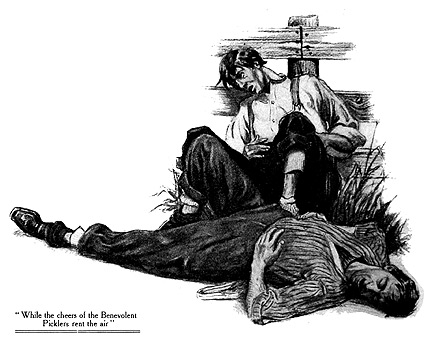
Murphy lay down on his back on the track and gasped, and Casey leaned up against the fence and panted, while the cheers of the Benevolent Picklers rent the air.
"Wan minute!" called the referee, sharply, as the judge was about to announce Casey's victory. "Casey, where's th' brick?"
Casey's mouth fell open.
"Dang!" he gasped, "I left it -- around awn -- th' other side -- av th' hill!"
"'T is a foul!" exclaimed the referee. "Casey has throwed away th' handicap. 'T is Murphy's race!"
Murphy sat up and a smile of pleasure lighted his face.
The starter got behind him to help him to his feet.
"Wait a bit!" said the starter, " Wan thing I want t' ask Murphy first! Murphy, whin did th' bile awn yer neck bust?"
"'T was -- 't was when Casey lost th' brick," he answered, for he would not tell a lie.
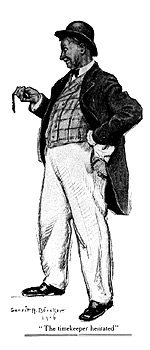
"Then th' handicaps is even," said the referee, "and Casey wins, but what does he win, I dunno. 'T was a mile race on th' program, but wan quarter they ran th' wrong way around, and does it make free quarters av a mile, or wan mile, or wan mile an' a quarter, I dunno. But annyhow, 't was a fast race fer such slow runners. What was th' time of it?"
The timekeeper hesitated.
"'T was an' hour an' some more," he said, "but how much more, I dunno, fer I was fergettin' t' wind me watch last night and it ran down on me; but 't is safe t' say th' toime av th' race was an hour an' mebby another wan."